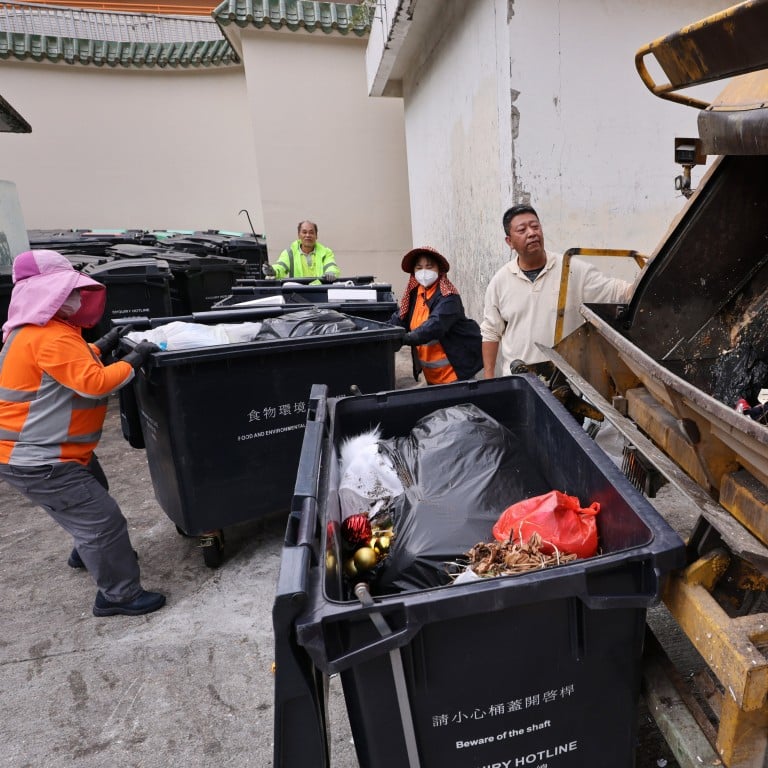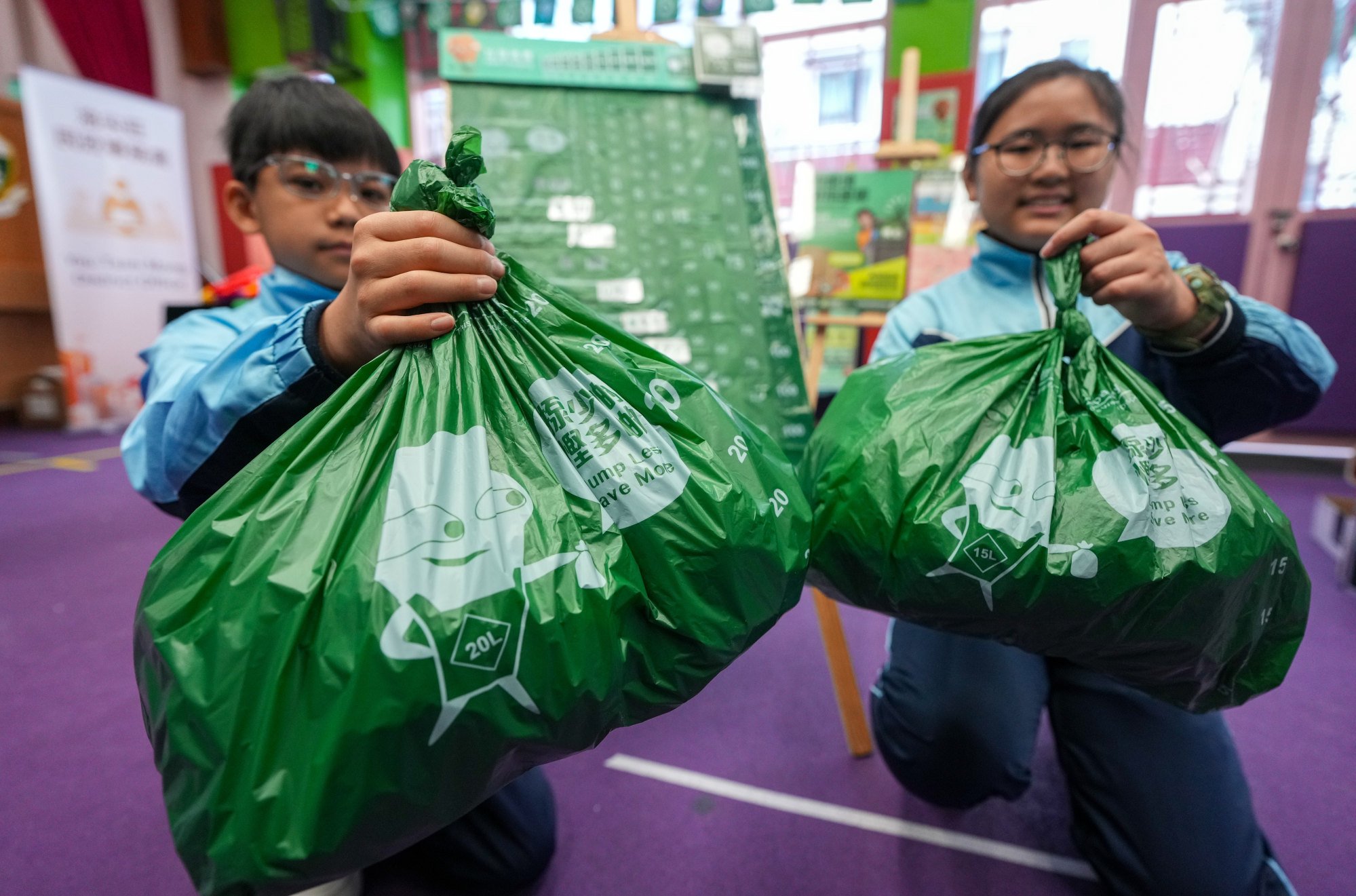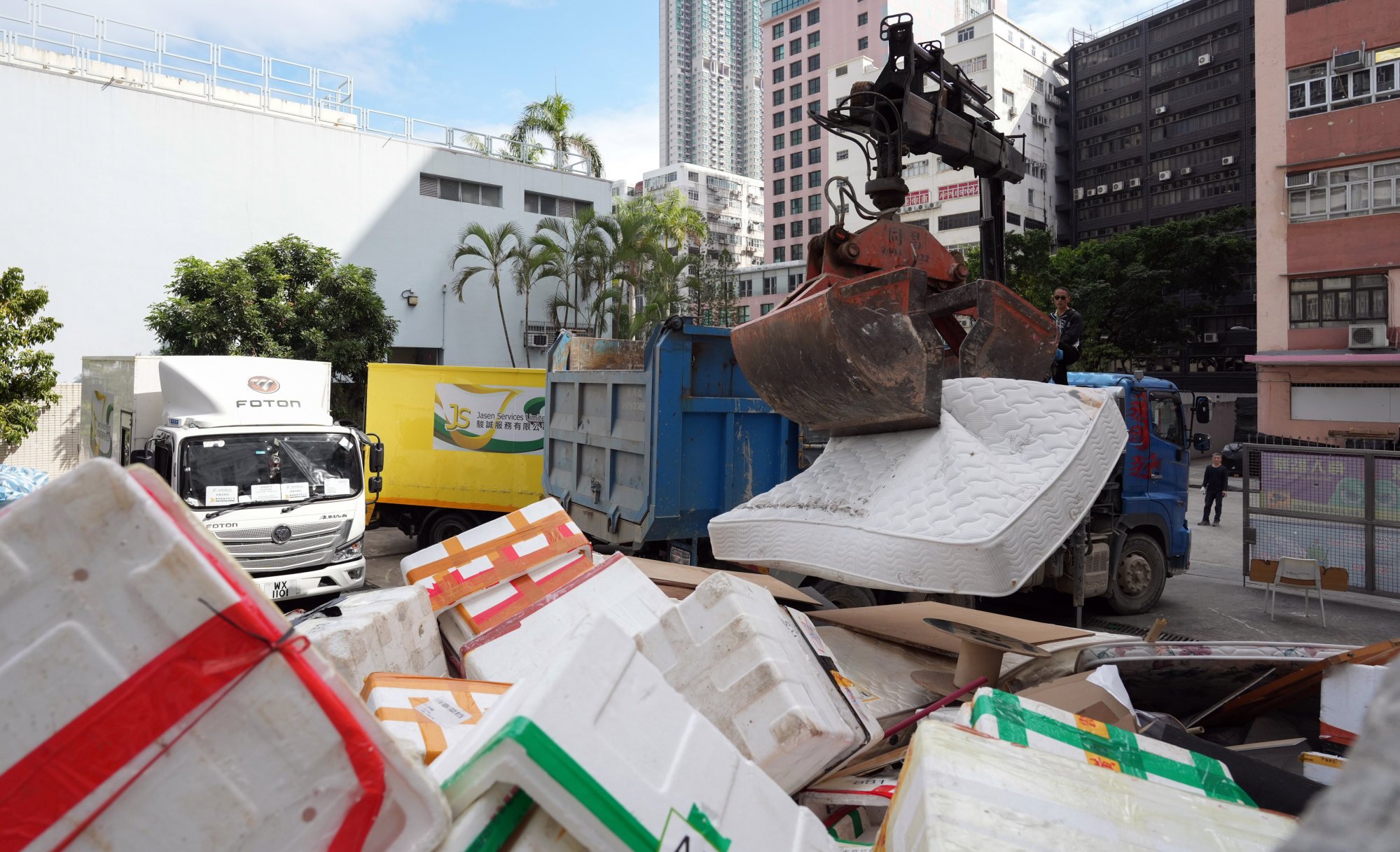
Explainer | What you need to know about Hong Kong’s coming waste-charging scheme, from getting bags to saving money
- City’s long-delayed municipal waste-charging scheme to take effect from August 1
- The Post has prepared a guide to the scheme and what residents need to know
Twenty years after the idea was first floated in Hong Kong, waste charging will take effect on August 1, in an effort to cut down on the amount of rubbish thrown in landfills.
From this date, Hongkongers will be required to use prepaid, government-approved garbage bags to dispose of their trash, with the scheme covering most residential and commercial premises. Designated labels will also be sold for large or oddly sized items.
Authorities initially planned to implement the measure by the end of 2023, but delayed it to April 1, citing logistical reasons. On January 19, Secretary for Environment and Ecology Tse Chin-wan made an abrupt announcement to postpone it again to August 1, after the government decided there was a need for more publicity efforts.
The Post has prepared a guide to the scheme and what residents need to know.

1. Where can I buy bags and how much do they cost?
The government had announced that garbage bags would be sold from about 3,000 authorised sale points in stages from the end of January. These include places such as supermarkets, convenience stores and pharmacies.
Under the charge-per-bag arrangement, residents will pay 11 HK cents (1 US cent) for each litre of garbage they throw away. The smallest bags, with a capacity of three litres (0.8 gallons), will start at 30 HK cents each, rising to HK$1.70 for a 15-litre bag and HK$11 for the largest 100-litre bags. The bags will be available in nine different sizes.
In 2021, Hongkongers sent about 1.53kg (3.4lbs) of garbage each to landfills every day, according to official statistics. A household that produces 15 litres of garbage per day can expect to spend about HK$52 per month on the bags.
A 50-piece roll of regular 15-litre garbage bags currently costs HK$18, or 36 cents per bag, on retailer HKTVmall’s website.
Retailers will also be able to sell the authorised bags at the checkout for customers to carry their purchases in a bid to encourage reuse, on top of the option to buy a regular plastic bag or use their own carrier.
Housing estate property management offices and residents’ organisations will also be able to purchase the bags in bulk to sell to residents, and can apply to do so via an online platform managed by the Environmental Protection Department. It said it had received about 6,300 such applications as of mid-January.
2. How can I pay less?
As the scheme is based on a polluter-pays principle, the simplest way to reduce costs is to filter out recyclable materials, such as plastic bottles and boxes, aluminium cans, and glass bottles, and dispose of them separately in recycling bins.
Recyclable materials do not need to be disposed of in the approved bags.
Hong Kong’s community recycling network currently operates more than 170 collection points across the city, covering nine types of common recyclables. The points include 34 recycling stores and more than 130 once-a-week kerbside collection booths.
Another option is to recycle food waste by separating it from any non-food waste, draining it of liquid, and taking it to special food waste bins at designated collection points.
Official views differ on strength of Hong Kong waste-charging publicity efforts
The environmental authorities are installing smart recycling bins for collecting food waste at all public rental housing estates. By Lunar New Year starting on February 10, the service will cover 100 estates, benefiting around 1.15 million residents.
Some private housing estates will also get government help with the smart recycling bin installation. A total of 100 bins will be installed at 30 private housing estates and three rural villages by the holiday.
3. What happens if I don’t comply?
There will be a six-month grace period after the scheme takes effect, during which people who fail to comply will mostly be given verbal warnings.
After this time, people who fail to use the designated bags or labels will face a fixed penalty of HK$1,500. Serious or repeat offenders could be prosecuted and face fines between HK$25,000 and HK$50,000, and up to six months’ jail.
Anyone who causes another person to commit the offence, such as an employer instructing a domestic helper to dispose of waste in a non-compliant manner, will also be held responsible.
‘Hong Kong buildings undecided on illegal dumping measures under waste scheme’
But observers and stakeholder groups have raised concerns over apparent loopholes and grey areas in the law, such as how property managers and cleaners should deal with improperly packed trash in residential blocks with communal waste disposal points or garbage chutes and households that breach the rules.
While the scheme is primarily targeted at households, cleaning contractors or workers can also be held responsible if they do not make sure waste is properly packed in the authorised bags before handing it over to garbage trucks or collection points.
Environment minister Tse on January 16 said officers would be empowered to enter residential buildings to carry out enforcement action, though he did not elaborate on how this would be done.

4. What about big items such as furniture?
Bulky items that cannot fit into one of the authorised bags need to be affixed with a designated label before being taken to garbage collection points for disposal. The labels cost a flat rate of HK$11 each.
Conversely, the designated garbage bags do not need to be used for small amounts of personal trash generated while outside or in public, and people can dispose of these in public bins as they normally would.
But using public trash cans to circumvent the waste-charging scheme is forbidden, and members of the public who dispose of their household garbage illegally in public bins may be fined HK$3,000.
Hong Kong to sell rubbish bags with special authenticity labels for waste charging
5. Do I get a grace period?
Besides the six-month grace period on enforcement action, the government has said households in public rental estates, rural areas and residential blocks with no owners’ corporations or property management companies will get 20 free 15-litre bags monthly for six months to help residents adjust to the scheme. It has so far not taken up suggestions to expand the free bag distribution.
Some building management committees have come up with private plans to help their residents adjust, such as distributing the bags to residents for the first few months and passing on the costs in the form of management fees.
On January 16, minister Tse also floated a suggestion to give primary school pupils a 15-litre version of the new bags to bring home to help raise awareness.
The environmental department is expected to announce more measures to help drive publicity in the next few months, following Lee’s instructions to ramp up awareness.
Hong Kong property management firms ‘concerned over waste scheme breaches’
6. Is the scheme fair to everyone?
Welfare authorities have increased the amount of comprehensive social security assistance and old age allowance by HK$10 in response to the scheme. However, the subsidy was deemed insufficient to ease the burden on needy groups.
Care home operators earlier said they may face millions in extra costs from waste produced from carrying out their services, such as diapers and medical disposals.
Disability rights and patient campaign groups also expected to spend more than HK$90 a month in garbage bag costs for each household under the new scheme.
But the Environmental Protection Department has so far declined to explore exemptions, saying this would undermine the polluter-pays principle of the scheme and pose enforcement challenges.



